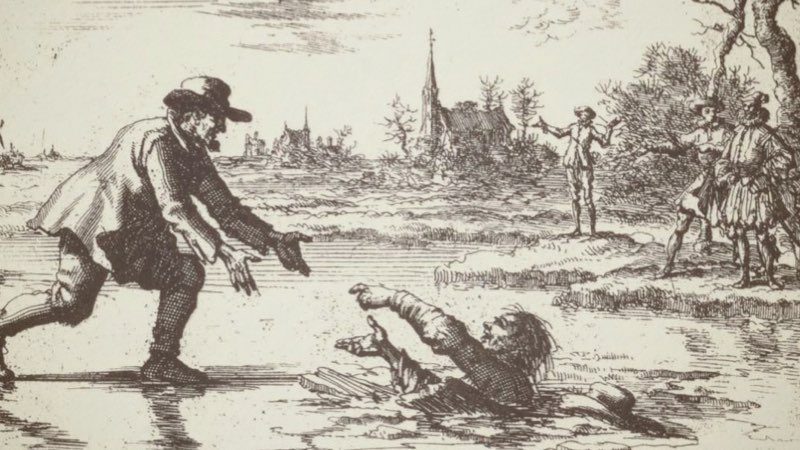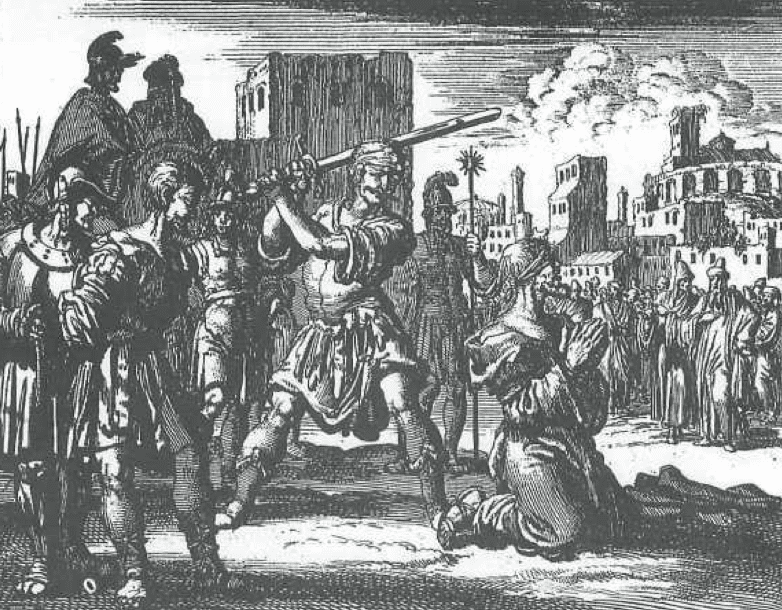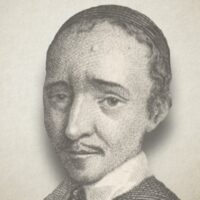
23. The Apostle James, the Major
The Apostle James (the major) beheaded in Jerusalem, A.D. 45
James, the Son of Zebedee, Put to Death with the Sword, by Herod Agrippa, in Jerusalem, A.D. 45
James, surnamed the Greater, was the son of Zebedee and Salome, and a fisherman by occupation; but, Christ having called him to be His disciple, he abandoned fishing, and followed Christ. Matt. 4:21; Mark 1:19.
He was instructed for a considerable time together with the other disciples in the duties of the apostleship, until he was properly sent out in that capacity. Matt. 10:2; Mark 6:17; Luke 6:13.
He was endowed with the gift of working signs and miracles, and on account of this special gift he was one of the three surnamed Boanerges, that is, sons of thunder. He was with Jesus on every remarkable occasion; so much so, that he was chosen by the Lord to behold His glory upon the holy mount; and, afterwards, to witness His sufferings in the garden of Gethsemane. Mark 3:17,18; Matt. 17:1; 26:36.
Of him Christ had predicted, that he should drink of the same cup, of which He (Christ) would drink, and that he should be baptized with the same baptism, with which He was baptized; that is, that he should be subject to His (Christ’s) suffering and death. Matt. 20:22,23.
After the death of Christ he joined the other apostles, to be a witness with them, of His suffering, death, and resurrection, and to be instructed concerning His kingdom during the forty days after His resurrection.
After Christ’s ascension he also remained at Jerusalem; and when he, together with the other apostles, had there received the Holy Ghost, he preached the Gospel in Judea and Samaria. Acts 1:13,14.
From there, as some relate, he went to Spain; but, meeting with little success, he returned to Judea, where, it is said, he was opposed by Hermogenes, a sorcerer. But as Abdias, bishop of Babylon, and others, relate many things of him, which seem to be altogether fictitious, we shall not mention them. Petr. de nat. lib. 6. cap. 133. Abdias Babyl. van den Strijd der Apostelen.
This apostle lived only until the fourth year of the Emperor Claudius, at which time, Agabus had predicted, there should be a dearth throughout all the world. Oros. lib. 7. cap. 6.
At that time Claudius charged Herod Agrippa to suppress the church of Christ. Then Herod laid his bloody hands on this apostle and, on the feast of the passover, put him in prison. Shortly afterwards he was sentenced to death, and executed with the sword, in Jerusalem. This occurred in the year forty-five after the birth of Christ. Acts 12:2.
Clemens relates that the executioner, seeing his innocence, was converted to the Christian faith, and died with him. According to the annotation of Eusebius Pamphilius, from Clemens Alexandrinus, the executioner was so moved on account of the death of James, that he professed himself to be a Christian; and so, as he states, both were led forth together to death. As they were led out, the executioner asked James to forgive him. James, after a little deliberation, said, “Peace be with thee,” and kissed him. And thus both were beheaded. Euseb. lib. 2. cap. 9. ex Clem. Alexand. Also W. Baudart. Apophthegmat. lib. 1. page 4. from Joach. Camer. in vita Christi, page 42. Niceph. lib. 2. cap. 3. Strac. in Festo Jatobi, page 209. Cle. Circa, cap. 45. Annum.
James was the first martyr of the apostles. This history shows the alacrity of the ancient believers.
Thieleman J. Van Braght (1625-1664) was an Anabaptist who is best known for writing a history of the Christian witness throughout the centuries entitled “The Bloody Theater or Martyrs Mirror of the Defenseless Christians who baptized only upon confession of faith, and who suffered and died for the testimony of Jesus, their Saviour, from the time of Christ to the year A.D. 1660” (1660).
Thieleman J. Van Braght, Martyrs Mirror




